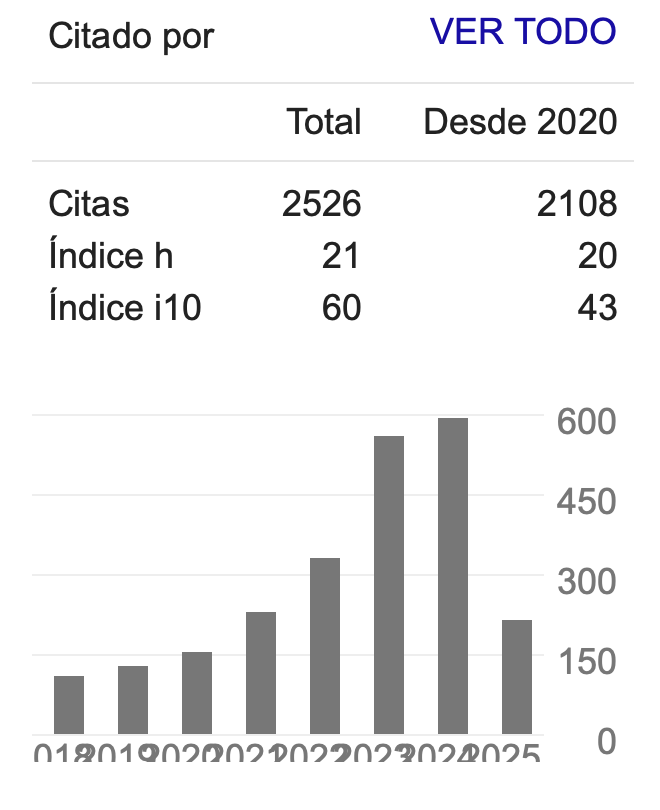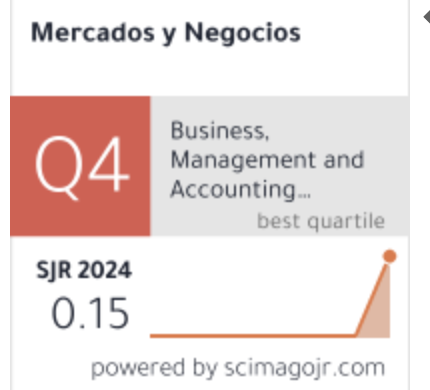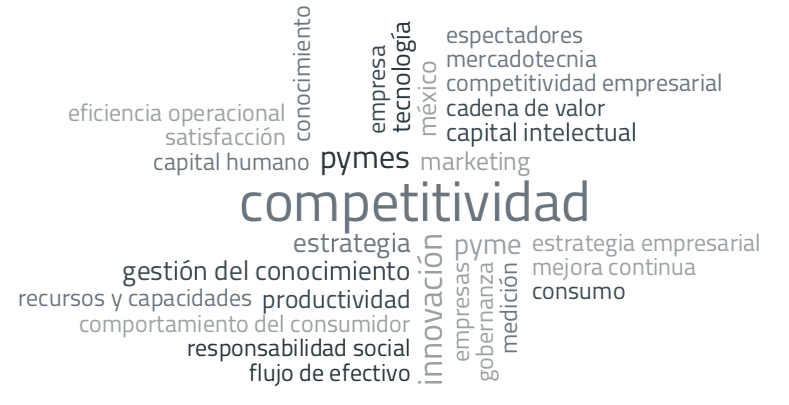Nivel de desempeño en manufactura esbelta, manufactura sustentable y mejora continua
DOI:
https://doi.org/10.32870/myn.v0i31.4297Keywords:
manufactura esbelta, manufactura sustentable, mejora continua, eficienciaAbstract
40 plantas de manufactura medianas (12) y grandes (28) de Apodaca, México, fueron encuestadas para investigar el nivel de implantación de la manufactura esbelta, la manufactura sustentable, la mejora continua y su impacto en la eficiencia operacional y responsabilidad ambiental en ellas. En las dos categorías de plantas se encontró que el desempeño es bajo. En ambos casos es preocupante que en el municipio altamente industrializado de Apodaca, México, no se estén adoptando de manera decisiva las filosofías mencionadas. Finalmente se muestran los resultados estadísticos obtenidos en las respuestas de los gerentes de planta a los ítems del cuestionario. Esta información puede ser útil a la administración de las plantas para identificar y definir acciones específicas de mejora.References
Amin, M. A., y Karim, M. A. (2013). “A time-based quantitative approach for selecting lean strategies for manufacturing organisations”, International Journal of Production Research, 51(4).
Arrieta, J. G., Botero, V. E., y Romano, M. J. (2010). “Benchmarking sobre la manufactura esbelta (lean manufacturing) en el sector de la confección en la ciudad de Medellín, Colombia”, Journal of Economics, Finance and Administrative Science (en línea), 15(28), pp. 141-170.
Austin, D., Saleeshya, P. G., y Vamsi, N. (2013). “A model to assess the lean capabilities of automotive industries”, International Journal of Productivity and Quality Management, 11(2): 195.
Bergmiller, G. G., y Mc.Cright, P. R. (2011). “Lean and sustainability programs: Evidence of operational synergy for lean manufacturers and logical growth toward sustainability”, Review of Business Research, 11(5): 58-68.
Cardozo, E. R., Rodríguez, C., y Guaita, W. (2011). “Las pequeñas y medianas empresas agroalimentarias en Venezuela y el desarrollo sustentable: Enfoque basado en los principios de la manufactura esbelta”, Información Tecnológica (en línea), 22(5): 39-48.
Cooper, R., y Maskell, B. (2008). “How to manage through worse-before better”, mit Sloan Managemet Review, 49(4), verano, pp. 58-65.
Environmental Protection Agency (epa). (2000). Pursuing perfection: Cases studies examining lean manufacturing strategies, pollution prevention and environmental regulatory management implications, 1(22). Estados Unidos: epa. www.epa.gov
Ferdousi, F., y Ahmed. A. (2009). “An investigation of Manufacturing Performance through Lean Production: A Study on Bangladeshi Garment Firms”, International Journal of Business and Management, 4(9): 106-116.
Ghosh, M. (2013). “Lean manufacturing performance in Indian manufacturing plants”, Journal of Manufacturing Technology Management, 24(1): 113-122.
Hair, J. F., Ringle, C. M., y Sarstedt, M. (2011). “Pls-sem: Indeed a silver bullet”, Journal of Marketing Theory and Practice, 19(2), primavera, pp. 139-151.
Henseler, J., Ringle, C. M., y Sinkovics, R. R. (2009). “The use of partial least squares path modeling in international marketing”, Advances in International Marketing, núm. 20, pp. 277-319.
Imai, M. (1986). Kaizen: La clave de la ventaja competitiva japonesa. México, df: cecsa.
Irastorza, V., y Fernández, X. (2010). “Balance nacional de energía y su relación con el inventario nacional de emisiones”, Revista Internacional de Estadística y Geografía México, 1(1), noviembre, pp. 52-57. http://rde.inegi.org.mx/revista_noviembre_2010/
Jiang, Z., Zhang, H., y Sutherland, J. W. (2012). “Development of an environmental performance assessment method for manufacturing process plans”, International Journal of Advanced Manufacturing Technologies, núm. 58, pp. 783-790.
Koenigsaecker, G. (2009). Leading the Lean Enterprise Transformation. Nueva York: crc Press, pp. 39-77.
Kpmg México. (2009). Encuesta: Desarrollo sustentable en México (2009). México df: kpmg Cárdenas Dosal, S. C., pp. 4-27. http://kpmg.com.mx
Lee, S. (2012). “The impact of manufacturing practices on operational performance”, Review of Business Research, 12(5): 184-189.
Liker, J., y Convis, G. (2011). The Toyota way to lean leadership. Nueva York: crc Press, pp. 1-10.
Millar, H. H., y Rusell, S. (2011). “The adoption of sustainable manufacturing practices in the Caribbean”, Business Strategy and the Environment, núm. 20, pp. 512-526.
Mit y bcg. (2009). “The business of sustainability”, mit Sloan Management Review, Special Report, pp. 3-14.
——. (2011). “Sustainability: The ‘Embracers’ seize the advantage”, mit Sloan Management Review Research Report, invierno, pp. 5-22.
——. (2013). “Findings from the 2012 sustainability and innovation global executive study and research report”, mit Sloan Management Review Research Report, invierno, pp. 1-13.
Monge, C. (2014). Impacto de la manufactura esbelta, la manufactura sustentable y la mejora continua en la eficiencia operacional y responsabilidad ambiental de las plantas de manufactura de México, tesis doctoral Universidad Autónoma de Nuevo León, México.
Monge, C., Cruz, J., y López, F. (2013). “Impacto de la manufactura esbelta, manufactura sustentable y mejora continua en la eficiencia operacional y responsabilidad ambiental en México”, Información Tecnológica, 24(4): 15-31.
Murugesan, T. K., Kumar, B. S., y Kumar, M. S. (2012). “Competitive advantage of world class manufacturing system (wcms): A study of manufacturing companies in south India”, European Journal of Social Sciences, 29(2): 295-311.
Reyes-Aguilar, P. (2002). “Manufactura delgada (lean) y seis sigma en empresas mexicanas: Experiencia y reflexiones”, Revista de Contaduría Pública y Administración México, núm. 205, abril- junio, pp. 51-67.
Ringle, C., Wende, S., y Will, A. (2005). Smart pls 2.0 M3. Next generation path modeling software. Hamburgo, Alemania.
Rodríguez, I. (2011). “Construya la eficiencia energética”, Revista Manufactura Expansión México, febrero, pp. 41-45.
Schneider Study. (2011). “Execs see energy as business, moral imperative”, Plant Engineering, núm. 1-2. http://www.plantengineering.com/single-article/schneiderstudy-execs-see-energy-as-business-moral-imperative
Spear, S., y Bowen. (1999). “Decoding the dna of the Toyota production system”, Harvard Business Review, sept-oct, pp. 95-106.
Toussaint. J. S., y Berry, L. L. (2013). “The Promise of lean in health care”, Mayo Clinic Proceedings, 88(1): 72-84.
Upadhye, N., Deshmukh, D. G., y Garg, S. (2010). “Lean manufacturing for sustainable development”, Global Business and Management Research, 2(1): 125-137.
Vinodh, S., y Dino, J. (2012). “Structural equation modeling of lean manufacturing practices”, International Journal of Production Research, 50(6): 1598-1607.
Wills, B. (2009a). Green intentions: Creating a green value stream to compete and win. Nueva York: crc Press, pp. 3-34.
——. (2009b). “The business case for environmental sustainability (green): Achieving rapid returns from the practical integration of lean and green”, hps White Paper, pp. 1-6. http://www.leanandgreensummit.com/lgbc.pdf
Womack, J. P., Jones, D. T., y Roos, D. (1990). The machine that changed the world: The storyof lean production systems. Nueva York: Rawson Associates, pp. 11-15.
Published
How to Cite
Issue
Section
License
Mercados y Negocios by Department of Mercadotecnia y Negocios Internacionales. University of Guadalajara is licensed under a License Creative Commons Attribution-NonCommercial 4.0 International.
The author retains the copyright.








